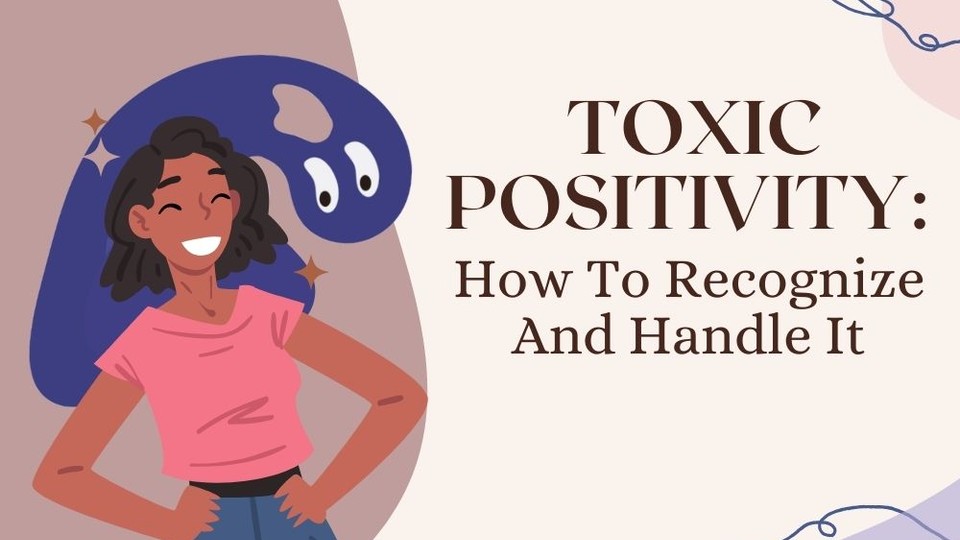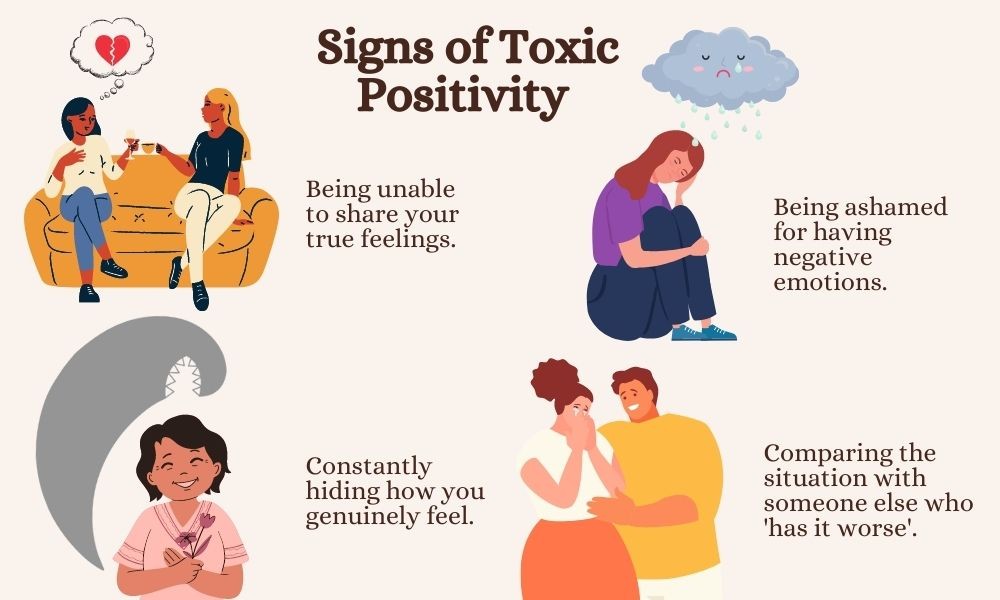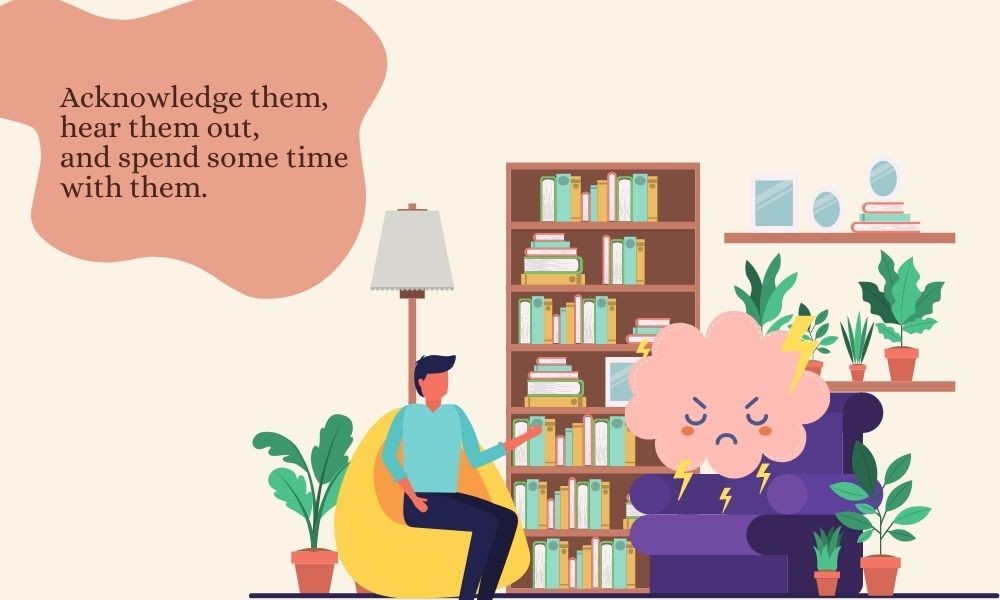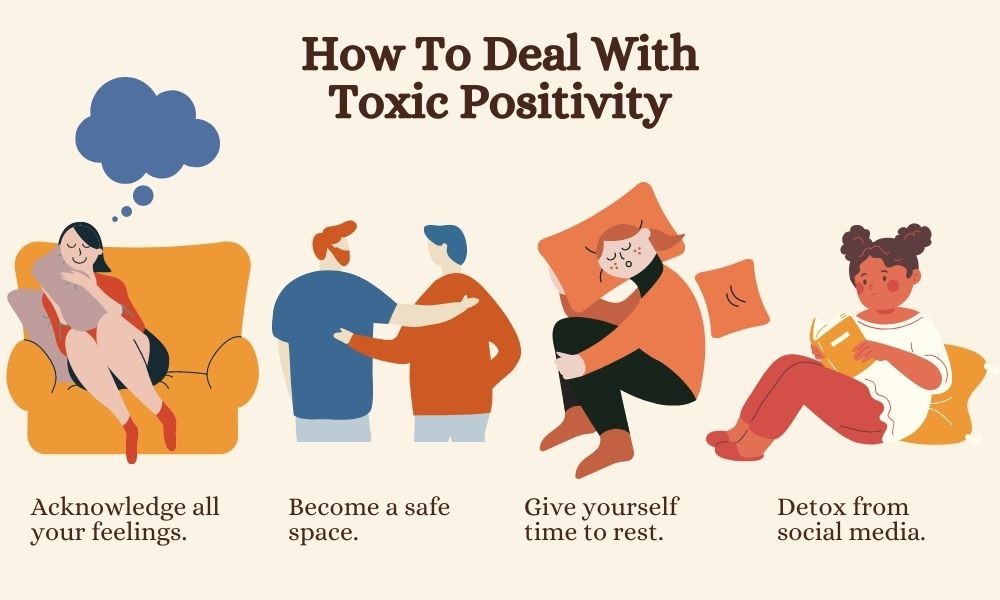
Have you ever felt that you wouldn’t be successful, liked, or validated if you weren’t a ray of sunshine 24/7? Do you feel the pressure to be cheerful and look like you’ve got your entire life together all the time?
And social media doesn’t make it any easier. With posts highlighting quotes such as, ‘positive vibes only,’ or ‘happiness is a choice,’ it almost feels wrong to have any negative thoughts or fully experience sadness, grief, anxiousness, despair, hopelessness, and worry.
And that’s how toxic positivity begins to bloom and take root in our mindsets and thinking patterns.
What Is Toxic Positivity?
Toxic positivity looks like shutting out negative thoughts completely and forcing upon yourself ingenuine ones that you might not even believe yourself. Dr Jamie Ackerman has a fantastic definition of toxic positivity.
Toxic positivity is the assumption either by oneself or others that despite a person’s emotional pain or difficult situation, they should only have a positive mindset.
And I have to admit that before all these quarantine epiphanies, I was someone who was toxic-ly positive without even having the slightest clue that I was. It crept into my life and seeped into my work and relationships. As I look back at my old social media posts and podcasts, and as genuine as it was to me at that time, I sounded so freaking happy, even though I probably wasn’t.
Without realizing it, many of us heave that pressure on ourselves to constantly put up a cheerful, bubbly, and happy front and be the person who lights up any room. I know I did because I thought that that was the only way I could achieve success and win the approval and affection of people.

Why Is Toxic Positivity Harmful?
Toxic positivity can be detrimental to the mental well-being of those going through struggles, challenging times, and personal distress. It can make you feel that your thoughts and emotions are unimportant or invalid and entangle you in overwhelming guilt and shame for not ‘choosing to be happy.’
As the grip of toxic positivity becomes more substantial in your life, you find yourself minimizing, denying, and invalidating emotions that are part of an authentic human experience. And ultimately, it robs you of opportunities to face those distressing feelings head-on, stunting your personal growth.
Additionally, toxic positivity makes it harder to form genuine connections with other people. Because how comfortable would you be spilling your guts out and pouring your heart out to someone with a never-faltering ‘just think happy thoughts’ outlook and a ‘positive vibes only’ mantra? In the end, we’re left with counterfeit connections, superficial relationships, and ankle-deep intimacy.
How To Recognise Toxic Positivity
Toxic positivity may start subtly, but even as it grows to become painfully obvious, we’ve become so accustomed and comfortable in that dysfunction that we don’t realise it’s toxic.
Recognizing signs of toxic positivity is crucial to stop it dead in its tracks and generate safer spaces for ourselves and others to talk about their genuine feelings. These are some examples of what toxic positivity can look like.
Imagine you tore your ligament while training hard at the gym, and your friend goes, “Well, at least you didn’t break your leg,” or “At least you’ve still got your leg.” It can feel extremely undermining and dismissive when someone compares your situation with another and tells you that you should be happy because someone else has it worse.
Additionally, terms such as ‘happiness is a choice,’ ‘look on the bright side,’ ‘be grateful for what you have,’ and ‘just think positive’ might sound encouraging and helpful on the surface. But if you’re going through an excruciatingly harsh season in life, hearing those terms can cause you to think that your emotions and experiences are invalid and may leave you feeling judged or condemned for not successfully maintaining a sunny outlook in life.
The Pressure To Be Productive
Other than the pressure to look happy and cheerful all the time, you may also experience the pressure to be productive and to keep ‘hustling’ till you make it.
This is especially relevant with lockdown when our primary goal might be to keep one foot in front of the other and make it through the day. Perhaps, it’s going through the day without having another anxiety attack or mental breakdown, and that’s what progress may look like during the lockdown.
Yet, social media is riddled with posts telling us that this is the best opportunity and timing to start a side hustle, learn a new language, pick up cooking skills, and be productive. Of course, if doing these things makes you happy, you are entirely entitled to do them. But if you have zero interest in carrying out these activities, there’s no need to pressure yourself to.
Ultimately, it’s best to try removing any expectation or narrative imposed by society of what we should feel, do, or have.
How To Handle Negative Emotions
There’s a poem called ‘The Guest House’ by Jalaluddin Rumi and translated by Coleman Barks. I find this poem paints a profoundly accurate and stunningly beautiful picture of our minds and thoughts.
Based on my interpretation, this poem metaphorically describes our mind as a guest house and all our thoughts as guests.
When thoughts come knocking on the door of our mind, trying to obtain permission for entry, we should meet them with love and laughter and invite them all in, both the good and the bad. Sit with them, enjoy a cup of coffee with them, and acknowledge their existence. Then, once you’ve spent enough time understanding them, you can kindly ask those less helpful ones to leave.

If we consistently bar specific thoughts and feelings from entry, they begin to pile up outside the door. It may only be a matter of time before you attempt to welcome in a good thought, and the multitude of negative thoughts lingering outside come pouring in like a flood. And this is symbolic of sudden anxiety or a mental breakdown.
It blows my mind how revolutionary this concept is to listen to our thoughts and emotions and make them feel heard instead of completely shutting out negative feelings.
At the same time, you need not identify with them. You are not the anxiety, sadness, grief, sorrow, or depression you experience. You don’t have to hand them the power to define the person you truly are.
How to Deal With Toxic Positivity

1. Avoid suppressing or suffocating your feelings.
Acknowledge all your emotions, both the mountaintop happiness and the valley’s low sorrows. They are all part of the authentic human experience, and if we choose to suppress certain emotions, they may later manifest as sudden anxiety, mental breakdowns, and depression in the long run.
If possible, always try to verbalise them to someone you trust, as this can help you acknowledge the reality of their existence as well. To finally get things off your chest feels like a massive weight has been eased off your shoulders, and both emotionally and physically, you may eventually feel that long-awaited surge of relief.
2. Listen to your feelings.
It’s crucial to acknowledge and listen to all your feelings, even those that are not as pleasant, because none of us can sustainably program ourselves to feel only happiness. Acknowledge all of them, but choose not to get stuck or trapped in a vicious cycle of purely negative thoughts.
Additionally, it may be beneficial to look on the bright side and find the silver lining at certain times in life. However, you don’t have to force this outlook upon yourself while you’re hobbling through a season of pain, loss, grief, or frustration.
3. Acknowledge that feelings don’t have to be mutually exclusive.
It’s totally okay to have two opposing feelings coexist simultaneously. For example, you may be feeling worried or anxious about the future but, at the same time, be hopeful for what’s to come.
4. Be compassionate.
You don’t have to shoot for the stars each day. Instead, it’s better to be realistic and set easy, small, practical, actionable daily goals for yourself because these baby steps will build solid habits in the long run.
And if you fail to achieve those goals, there’s no need to beat yourself up over it. Instead, there’s always room to show yourself more grace and compassion.
5. Be their safe space.
Forcing a positive outlook on someone stifles them from being honest and encourages them to stay silent about their pain, sorrows, and genuine emotions. Instead, be their listening ear, and create a secure environment for them to comfortably pour their hearts out without fear of judgment or condemnation.
You might have a different perspective or opinion from them, but there’s no need to impose yours onto them. Listening is an incredibly reassuring and encouraging form of support. And just by attentively listening to their thoughts, you may be helping them cope and recuperate from pain and hurt.
Of course, always be aware and alert of your own emotions and feelings while you’re at it. If the weight of what they share begins to grow heavier than you can bear, it’s okay to take a step back and safeguard your own mental well-being.
6. Call it out.
When you notice that someone acts or speaks in a toxic-ly positive way, call it out kindly and respectfully if you are in a comfortable position to do so. They may have the kindest motive behind their words and yet do not realise that what they are saying leads to more harm than good.
Alternatively, you may wish to form healthy boundaries with people who choose to invalidate, dismiss, or shame you for being genuine with your feelings.
7. Understand that rest is productive.
In a world where the hustle culture is magnified and highly praised, people are accustomed to thinking that rest equates laziness and a lack of persistence. Unfortunately, that couldn’t be farther from the truth.
There’s nothing wrong with striving hard to achieve your goals and ambitions. But resting is as productive as it helps you recharge, reenergise, and refocus, so you’re ready to take on what’s to come.
8. Take a break from social media.
Social media is the highlight reel of someone else’s life, and many people only post about their wins, successes, and filtered perspectives of their lives. Occasionally, some influencers are even paid to put their best foot forward and display their most glamourous content on social media.
Hence, taking a break from social media might be a strategic move to preserve your mental well-being. This is especially so if you constantly find yourself waging war with comparison and self-discontentment after interacting with their content.
Additionally, be aware of how you feel after seeing the content of some ‘positive’ social media accounts. If you catch yourself battling shame, guilt, and regret after viewing their ‘uplifting’ posts, that may be a sign of toxic positivity.
Final Takeaway
Negative emotions, when embraced and acknowledged, can breed the power to positive changes in life and generate deeper authenticity.
Rather than having a monochromatic mindset regarding how humans experience feelings, it’s much better to acknowledge all of our emotions, both the good and the bad. By insisting on an ‘only positive’ outlook on life, you’re oppressing opportunities to better understand yourself and form more meaningful relationships with people around you.




